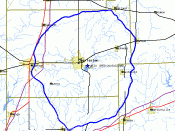The main purpose for the existence of the Federal Communications Commission's licensing system is to protect the public interest. The licensing of television and radio stations ensures that the electromagnetic broadcast spectrum, which is a scarce resource, is properly distributed to those that can best operate the facilities while providing programming that is of interest to all. The application of a broadcast license involves many steps and it varies for FM and AM radio stations. The Mass Media Bureau of the Federal Communications Commission is responsible for regulating the television and radio stations in the United States. The Bureau issues broadcast licenses specifying the community of license, the channel and operating power of the station. The conditions of the license ensure that the broadcast will be picked up without interference. If problems arise, the Bureau investigates and resolves the problems.
The licensing of radio stations began with the Radio Act of 1927 in which the Federal Radio Commission (FRC) was established based on requests from the industry itself.
This act along with the Communications act of 1934 allowed the commission to create and enforce standards for the use of the public airwaves. While the commission does not have power over the entire radio spectrum granted by International treaty to the United States, as half the available frequencies have been designated for government use, the commission does control all commercial and private requests. Because the radio spectrum is not large enough to accommodate everyone who might want to use it, an application and licensing system has been established. This standard of licensing does not use a lottery or auction to the highest bidder, but instead grants licenses based on the 'best qualified to serve the public convenience, interest, or necessity.' (FCC - What it does, page 379) Such licenses...


